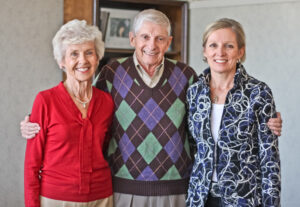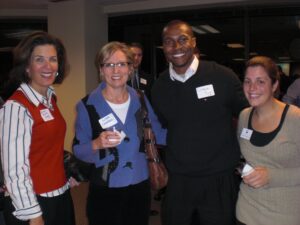In partnership with The Denver Foundation, Linda Campbell’s philanthropic journey has taken a deep and personal turn.
When Linda Campbell was a child growing up in Denver, she and her parents and siblings sometimes delivered Thanksgiving dinners to people in their community who couldn’t afford to buy their own. Some of them worked for her family’s company, which was growing. It was an act of kindness borne of her parents’ orientation to help others and share their good fortune. But Linda remembers having mixed feelings about having so much to give when others had so little.

“My family had very middle-class values,” she says. “As my dad started to make more money, it was important that we kept those values. There was this idea that, ‘We’re not better than anybody else. Everybody struggles at different times.’ We were always generous. At the same time, it was clear that we had a lot more than most people, and that was sometimes uncomfortable.”
Many years later, when the Campbells sold the business, their ability to give grew exponentially. With proceeds from the sale, the family established their own foundation as a donor-advised fund at The Denver Foundation, which provided a platform for their generosity to be effectively channeled. Linda and her siblings were involved with decisions on where to give, alongside their parents, Jim and Janice. In 2018, the Campbell Family Foundation made its largest grant to date – $1 million to support trauma-informed education within Denver Public Schools.
Through the Campbell Family Foundation and her own donor-advised fund, which she established in 1999 Linda’s relationship with The Denver Foundation deepened, as well as her commitment to philanthropy.
Today, she is the embodiment of an “engaged philanthropist”: She marries generous financial investment with a deep personal involvement with the issues that matter to her most, including climate change and advocacy for women, children, and families.
Linda served on The Denver Foundation’s Board of Trustees for six years and on many of its committees. She is a co-founder of The Denver Foundation’s Environmental Affinity Group, a collective of passionate donors who support organizations and initiatives that advance sustainable practices, renewable energy, and environmental education.
“Serving on the board and in particular, working with Strengthening Neighborhoods, helped me to find my place in philanthropy. I really like supporting small, start-up organizations where passion is what drives the people involved. I continue to support many of the start-ups and young organizations that I discovered through The Denver Foundation.” Campbell added, “It was also very meaningful for me to work closely with such a diverse group of staff and board members who were committed to making inclusivity foundational to the work we were doing. I have a mixed-race family so that fit nicely with my own values and hopes for the world.”
Being a board member also provided opportunities for Linda to explore new opportunities and to connect with a larger community. “I was learning about Socially Responsible Investing through Rachel’s Network, a group of environmental women funders that I am a member of. That learning experience helped me to encourage more socially responsible investing at The Denver Foundation. It has been very rewarding to see the success of that fund. I found my people at The Denver Foundation, and my time there was nothing short of transformational!”
Linda is also a committed supporter of the Critical Needs Fund, the Black Resilience in Colorado Fund, which launched at the foundation in 2020, and the Strengthening Neighborhoods program, which provides small grants to emerging, community-led organizations.

“I was at a Council on Foundations conference when [well-known speaker and spiritual advisor] Wayne Muller asked a very interesting question: ‘What is the smallest gift that you can remember that is meaningful to you? It really made me think about the impact of a small gift,” she says. “Now, through my involvement with Strengthening Neighborhoods, I find people doing good things in our neighborhoods and I give them a small amount of money.”
“Everybody gives in different ways,” she continues. “I’m like my own little community foundation. I give a small grant to more than 50 organizations each year, and I have some kind of relationship with someone at almost all of the organizations I support. I think believing in them is just as important as the money.”
Linda’s involvement with one of the organizations she supports unlocked an interest that turned into a passion – and then a career. At The Conflict Center in northwest Denver, she learned about the practice of restorative justice, which is designed to repair harm caused by crime or conflict while fostering healing and accountability. Among other things, restorative justice is used to disrupt what’s known as the “school-to-prison pipeline” by reducing the negative and often life-altering consequences of racial bias in schools.
After working with public schools, Linda now leads restorative justice work throughout Metro Denver on behalf of the Denver District Attorney. She says this shift in career focus is just one example of the ways that her giving, and her relationship with The Denver Foundation, have shaped her life.
“I get kind of spiritual when I think about it,” she says. “My involvement with restorative justice was happening at a time of great change and personal growth in my life,” she says. “The Denver Foundation was part of that. The really high values that the foundation had, the diverse board and staff, it all pushed me in terms of my thinking about inclusiveness. It was a group of people that I really admired, and it made me stand up and says, ‘I do want to be a philanthropist, and I want to be it in my own way, with this wonderful group of people.'”